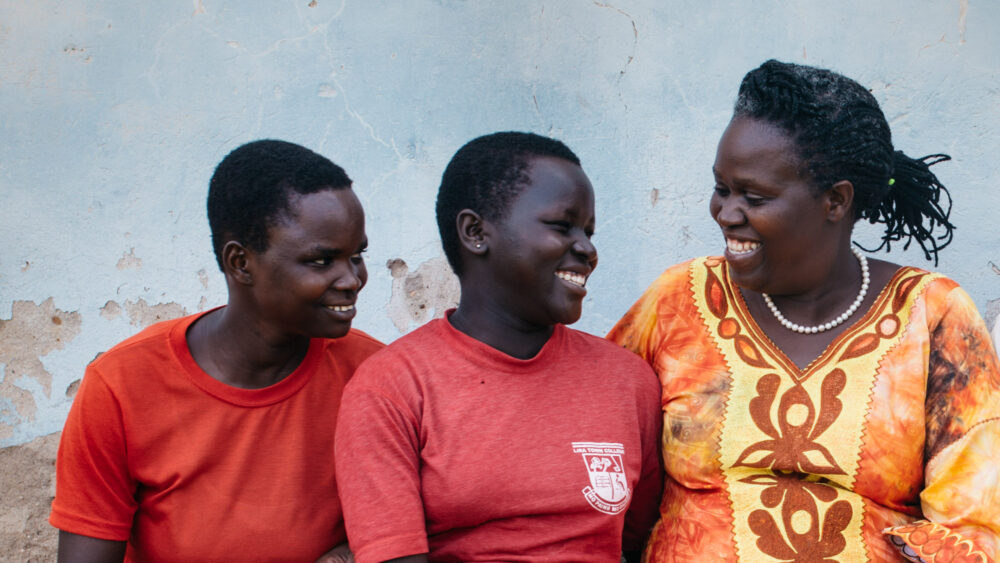The girl who restored hope to hundreds of victims of war
How Alice Achan survived chaos and trauma to establish her ‘School of Restoration’
Trigger warning: This story contains references to rape and sexual violence, and discussion of the loss of a child.
The beginning of civil unrest
Alice Achan lived a happy, peaceful life in a village in northern Uganda until 1986 when a neighbouring tribe came to steal her family’s cattle – at gunpoint.
Aged just 13, Alice was forced to run for her life into the bush with two child relatives, returning home three days later to find her brave father powerless, afraid and defeated.
Soon after that awakening to fear, Alice found herself in the middle of a battleground when the Lord’s Resistance Army began to terrorise her village as they fought government forces. The brutal rebel force captured local boys to join the fighting and abducted girls as sex slaves for their commanders. Terrified, Alice and a group of other girls had to hide in the bush each night – for two years – as gunshots flew overhead between the rival groups.
“That was a time that there was a takeover from another government to the current president,” Alice explains to Eternity.
“They were fighting groups from the previous government, but also that group of local cattle rustlers. And then there was also some others from the government who were following either those or the [rustlers] – and the rebels.
“So we had these three groups, but you really will not distinguish which one is the good one. Which one? Everyone was a suspect. Because you didn’t know – they were all wearing a kind of army uniform.”
“You really will not distinguish which one is the good one. Which one? Everyone was a suspect.” – Alice Achan
Alice came to Australia in March to promote her gripping memoir, The School of Restoration, co-written by Philippa Tyndale – but has been unable to return home because of COVID-19 travel restrictions.
She tells Eternity that when the ferocious fighting in nearby villages became almost continuous, she spent two weeks in the bush, living off peanuts and wild fruits, and looking after a group of young children.
“Life really became so difficult at the early age for me because there were gunshots and military everywhere. During this time I really felt scared, I didn’t know who is coming and what would come next,” she says.
“Even our father could not protect us anymore because adults had no voice. And the military groups had taken over the village. They had no capacity because they had no guns.”
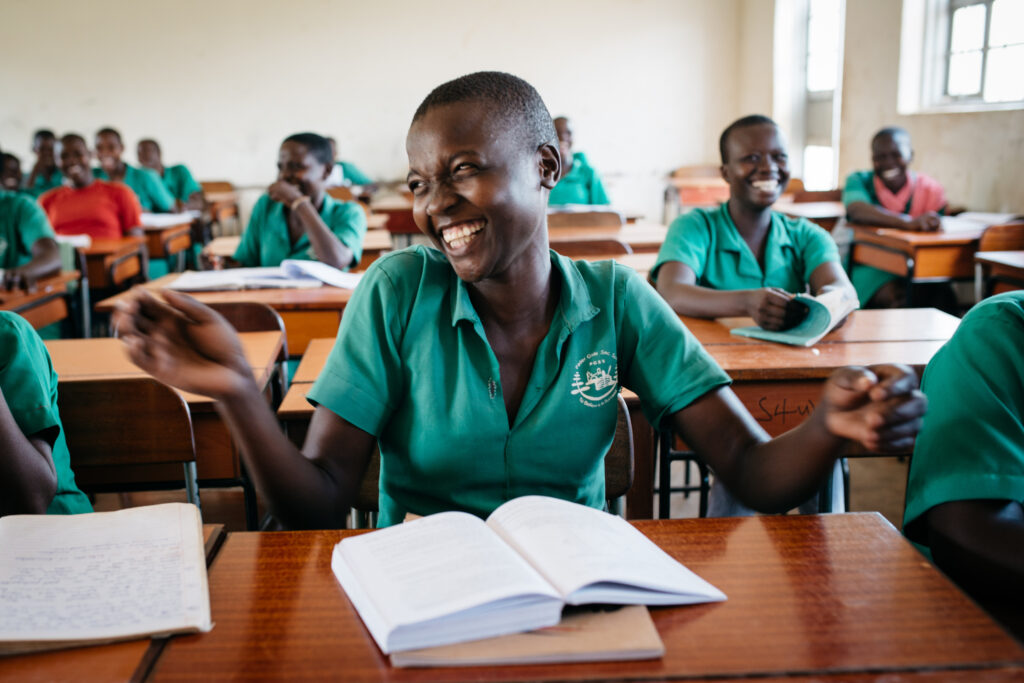
Pader Girls Academy aims to build confidence and healthy self-esteem in the students
Whenever the guns fell silent, Alice would sneak back home to stay briefly with her family again. Once gunfire erupted again, she would run away to escape abduction by the brutal LRA.
“We were in total confusion because we didn’t know what our next move would be. You’d wake up in the morning, and either your friends are dead, or they have been abducted. You don’t know where they are, so you would feel that, am I going to be the next person? It was a scary time.”
“You’d wake up in the morning, and either your friends are dead, or they have been abducted.” – Alice Achan
Coming from a Christian family – although one of mixed African culture that included multiple wives – Alice found herself turning to God for protection.
Her trust in God solidified on a particularly fine and sunny day in December when she felt that nothing was blocking her view of his glory.
“The sky was blue, and the sun was very strong. I guess as a child I saw the glory of God and the protection of God and the assurance that ‘I will not leave you.’ I could not express it, but I had that strong feeling that it was a communication with God,” she says.
Study in a time of civil war
Eventually, Alice’s brother decided to take Alice and three of his young children to the larger city of Gulu, so they could return to school.
“We walked on foot from my village to the city, which took us almost three days, and we had three little children with us. I stayed with them for a whole year without their mum. I was alone in the house, you know, making sure they ate.”
“Every night in that city there was fighting between the rebels and the government soldiers. So I think God knew exactly where he wanted to take me because he put me into this early responsibility.”
“I really felt so compelled to trust in the Lord because I didn’t have anybody.” – Alice Achan
When Alice’s brother Gabriel left Gulu with his family for Jinja in the south of Uganda, outside the LRA conflict, Alice stayed behind in a boarding school. One night the LRA rebels came to the school and lied their way into the locked dormitories. Alice was one of only six girls who escaped abduction. The next day she followed Gabriel and his family to Jinja, but her reprieve was short lived.
“In Grade 7, I was taken to study in Karamoja, very far away from my village. It was at that time that I really felt so compelled to trust in the Lord because I didn’t have anybody.
“I think that my reality [was] my brother would bring food during that time, because there was so much famine … That was a very difficult time, but it was also a turning point to be working right with God, trusting with maturity and spiritual connection and knowing that was between life and death for me.”
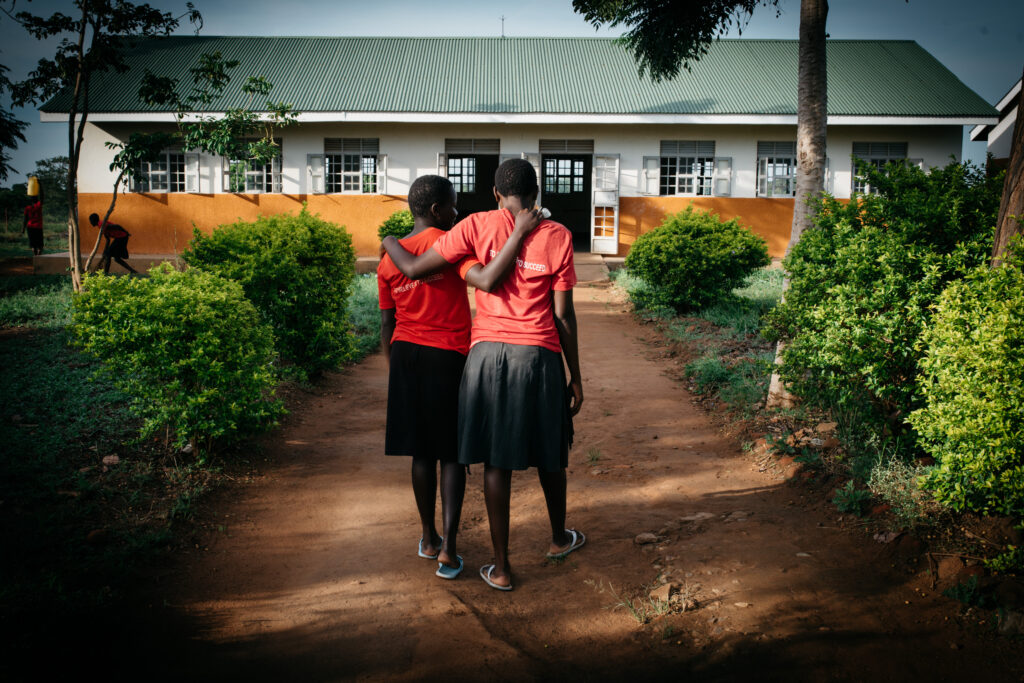
Sisterhood: the school aims to create friendships that will allow the girls to support each other and overcome trauma
Alice had almost made her way through secondary school when her education was once again interrupted by the need to take care of Rachel, her six-month-old niece, and two older nieces, Diane and Lucy, whose mother had died of HIV/AIDS.
“I had to drop out of school to take care of that baby and the older girls for almost a year. Then I went back to study again,” says Alice, explaining that she was determined to avoid her mother’s fate as a polygamous wife. She finally passed her senior exams in her early twenties.
Unfortunately, Alice’s world fell apart when one by one – first Diane, then Lucy and finally Rachel, the baby – died of AIDS. Losing Rachel was almost more than she could handle.
“That affected me so badly because I did everything I could. I prayed to God that he would spare her. I really regarded her as my child – we really had a lot of attachment. She went through a lot of pain because at that time there were no drugs for HIV.”
A dream is planted and begins to grow
Returning to her Acholi homeland during the height of the conflict, Alice felt a burden to work with girls who had been traumatised by sexual violence. So after completing a diploma in counselling and social work, she started working with an Italian organisation in northern Uganda. This eventually led to her setting up the Pader Girls Academy to house and nurture young women devastated by the LRA’s campaign, some of whom had missed years of education.
The inspiration came from the plight of a girl she met at a reception centre where she worked as a social worker reintegrating girls returning from the LRA into their families.
“There was one particular girl, Proscovia, who returned pregnant and with a child of about 2½ years old. Her parents were killed, so she had nowhere to go when we tried to reintegrate back into her community. No distant relative would accept her. She gave birth to her second child, and after I discharged her from the clinic, she had nowhere to go.”
So Alice took this girl into her own one-bedroom apartment and after six months enrolled her in an apprenticeship with a local tailor, who gave her a future by helping her set up her own tailoring business.
“I think meeting her really unlocked the ideas that I had for my girls’ centre – I saw the key was to unlock a desire to work, really.”
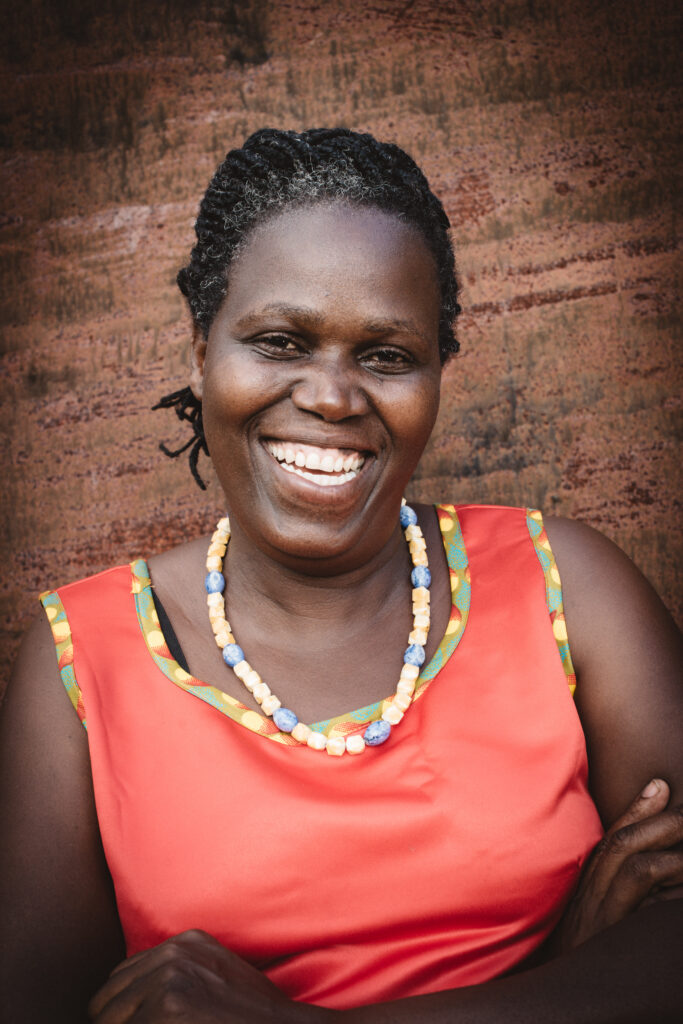
Alice Achan, founder of Pader Girls Academy
The Italian NGO she worked for offered her a scholarship for further study, and on the way south to Kampala, the capital, for her course she visited her sister in an IDP (Internally Displaced People) camp in Pader, not far from the village she grew up in.
“When I heard the stories of these women whose lives were so devastated, it just brought healing from all the trouble that I went through, the pain and suffering.”
“I had all this pain in me and I was like, ‘God, I think it’s over with you.’ So when this idea came, it was a big relief, a time of healing from all that I went through from my childhood trauma of the war, from losing these girls, from seeing so many women suffering.”
“I saw a big tree lying dead, completely dry. And then the second vision was of a very beautiful tree with shade.” – Alice Achan
When she returned from her studies, God spoke to her in a vision about what she should do.
“The first night, I had this dream where I saw a big tree lying dead, completely dry. And then the second vision was of a very beautiful tree with shade. And I really didn’t understand what God was speaking to me. So the following Monday I got up and nearby there was this big tree and I went and started praying over that tree.”
“And it became our routine. So many women came to start praying over there. And it became the genesis of what I’m doing now [at the Pader Girls Academy]. It became a place where women would come for fellowship, to do Bible study.
“The Bible became a very strong tool. Read and pray. Women would share their stories. We had soldiers who’d come and rape girls in the camps; we had still rebels who could come and abduct people in the IDP camp.
“So every morning, a mother would say ‘my girl was raped last night. But we don’t know who. We don’t know where to report. My children have been abducted and we don’t know where they are, and there’s no report.’ So women had a lot of stories that really made them feel so heavy.
“So there was a big healing point for me, and I guess the spirit of the Lord sent me this work that would become Christian Counselling Fellowship. We still call it Christian Counselling Fellowship, but what we have done is beyond counselling now.”
Meeting the needs of women and child victims of war
By 2004, with the fighting intensifying between the rebels and the government, the LRA released about 40 women and their children who were becoming a burden. But they had nowhere to stay because their families would not accept them back.
 With most of the international NGOs having left the area, Alice took up the challenge of providing for these girls and their children, praying for help with tents and food.
With most of the international NGOs having left the area, Alice took up the challenge of providing for these girls and their children, praying for help with tents and food.
“We started with an informal reception centre and the soldiers would provide food. We ran like this for almost six months, until UNICEF came in. Some were wounded and needed medical treatment. After about eight months, we started to provide counselling and rehabilitation to these girls, who had unique challenges.”
“Most of them had babies and some were pregnant. The challenge was that most of these girls would not be accepted back at home. So most of them were stuck at the reception centre. We started providing them training – basic skills in baking, in vocational skills. And we ran that for about five years until the LRA groups, the fighting groups, went into an agreement between the government of Uganda, which did not succeed, but it was good enough.”
With the fighting moving far away to DRC Congo, people in northern Uganda started moving back to their homes from the IDP camps.
It was then that Alice realised that some of the girls doing vocational training were brilliant, even though they had only completed Grade 6. But they could not go to school because of the need to look after their children.
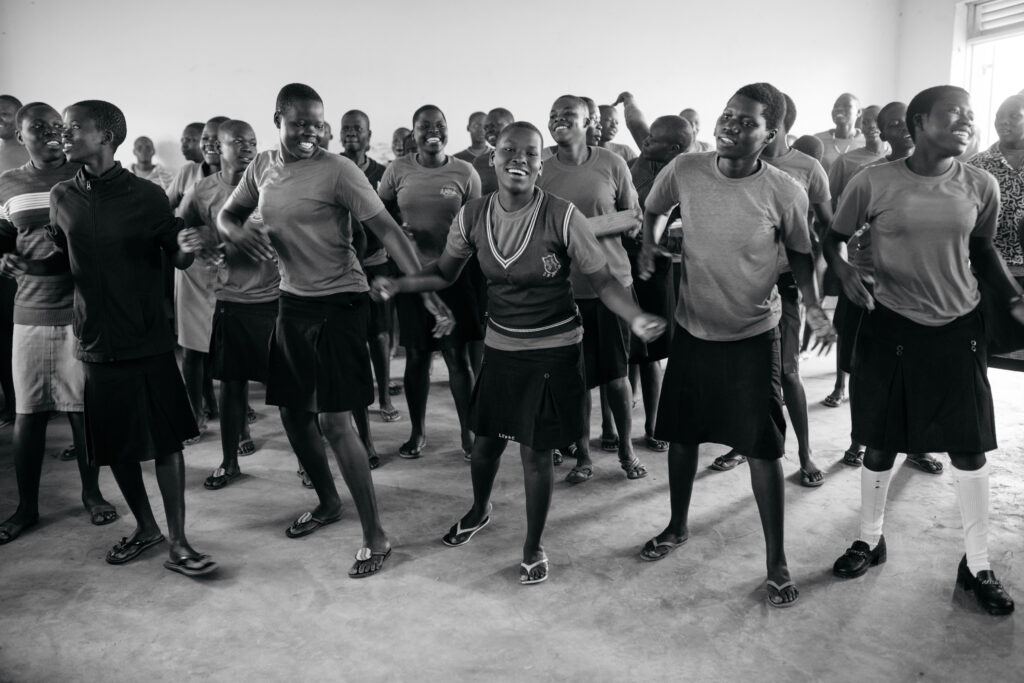 So in 2007, with funding from a US partner, construction began of the Pader Girls Academy with a design to help girls who had babies finish their education. A year later, it took in about 46 girls, all of whom had been abducted by the LRA and had babies or were pregnant.
So in 2007, with funding from a US partner, construction began of the Pader Girls Academy with a design to help girls who had babies finish their education. A year later, it took in about 46 girls, all of whom had been abducted by the LRA and had babies or were pregnant.
“It was honestly faithfulness and being humbled, available to serve God. So I was never scared about funding.” – Alice Achan
“That first contract we had with the partner was for 10 years. It was really unbelievable, having that long-term partnership with a partner who was committed to building the lives of girls. So they did that for 10 years – from 2006 until 2016.
“And God kept bringing people who said, ‘we want to do this. What are your needs?’ And God kept bringing the right people with really the heart to help the girls.
“Honestly, I was not scared. I was calm. I was very confident that this is not my work, because when I started this work, I had no higher education – I just had a diploma. So God was not looking at my qualification or looking at my skills, but God was looking at my availability. It was honestly faithfulness and being humbled, available to serve God. So I was never scared about funding.”
“‘You’re still alive – that is the most important thing that you have to appreciate. Thank God for that.'” – Alice Achan to her girls
One of the keys to rehabilitation for girls who had been badly mistreated and subjected to extreme sexual violence was forgiveness, says Alice.
“Even back when we are in the reception centre, one of our key messages was they have to forgive because the Bible said clearly if you forgive someone, God will forgive you and your sins will be forgiven and you will receive my blessing.”
“So we just focus on the word of God. Forgiveness, reconciliation. Just tell them, ‘Look where God has brought you from. You’re still alive – that is the most important thing that you have to appreciate. Thank God for that.’ So when they began to be confronted with this support, the word, the preaching, forgiveness became a key message to them.”
20 years on, the work continues
After 20 years of conflict, northern Uganda is now peaceful and most of the NGOs have moved on but, Alice’s grassroots organisation persists in its mission because, she says, communities have been destroyed – there is no social structure, social protection, social network for women.
“We still have a lot of teenage mothers who were born during the war in the IDP camps, and as they’re growing up, they cannot cope with life.” – Alice Achan
“There’s so many orphans who are left and they grew up as orphans or with grandparents. They became vulnerable.”
“We are witnessing a lot of sexual violence against women post-conflict, a lot of teenage pregnancy and also poverty … As I speak now, we still have a lot of teenage mothers who were born during the war in the IDP camps, and as they’re growing up, they cannot cope with life.
“They miss school because you will find a 16-year-old girl is going as a second wife or a third wife and our society cannot change that. It’s a big challenge, and many of them, they cannot hold on to that marriage. So instead of running back to that family, the family says, ‘no, we’ve already paid the bride price.’
“During the conflict, we needed food as an emergency, but now we have to deal with human minds.” – Alice Achan
“So she lands on the street and she becomes a prostitute. Child prostitution is very common. Besides the school, we have a rescue shelter for counselling. We have a shelter for the protection for women. We take them from the streets, put them in shelter, prepare them, and then enrol them back to school.
“But now we also had to back up our work with the community leaders, the church leaders, and police in prevention of this early marriage and pregnancy. Because it happens in the community. So we do mediation. During the conflict, we needed food as an emergency, but now we have to deal with human minds, community attitudes, and build a community that will respond positively to the needs of girls.”
Many of the girls who have graduated from the school now work as nurses and midwives, seeking to lower the rate of maternal and child deaths.
“These girls cannot access medical care because they may not have the resources. So we are running mobile clinics, targeting these girls, and we have a modest maternity centre in town which these girls can access.”
If you are interested in saving lives and supporting a mother through a safe birth, or helping a girl stay in school through a scholarship, there are plenty of affordable options on The Restoration Project site here.
If you or someone you know needs help, please call the Domestic Violence hotline on 1800 737 732 or Lifeline on 13 11 14.
If it’s an emergency, dial 000.
You can find other support services here.
Email This Story
Why not send this to a friend?
